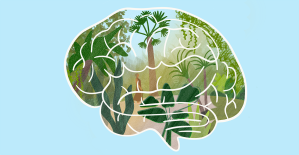Tag: Genetics
-
Health
Joslin Diabetes Center scientists find genetic defects in immunological tolerance
The genetic defect keeps the body from properly dealing with “errant” immune cells that it normally eliminates by a process called immunological tolerance. These immune cells then attack the insulin-producing…
-
Health
Researchers find better way to predict stroke risk in sickle cell anemia patients
Researchers from Children’s Hospital Boston, Boston University School of Public Health (BUSPH), Boston University School of Medicine (BUSM), Boston Medical Center (BMC) and Harvard Medical School have developed a novel…
-
Health
Largest twin study of age-related macular degeneration finds genetics and environment play large role in disease
Researchers led by Johanna M. Seddon, M.D., at the Massachusetts Eye and Ear Infirmary, Harvard Medical School and Harvard School of Public Health conducted the largest study of twins of…
-
Campus & Community
Researchers devise cheaper way to make genes
Harvard researchers have devised a way to greatly decrease the cost of making artificial genes in the laboratory, an advance that could increase the ability of geneticists to explore and…
-
Health
Protein packages activate genes
It’s all in the packaging. How nature wraps and tags genes determines if and when they become active, according to researchers from Harvard and M.I.T. They did the largest, most…
-
Health
Scientists discover “master switch” that triggers insulin resistance and type 2 diabetes
“We zeroed in on a factor called NF-kB,” said principal investigator Steven E. Shoelson, M.D., Ph.D., Helen and Morton Adler Chair and head of the Section on Cellular and Molecular…
-
Health
RNA-making apparatus seen to uncoil and recoil DNA
Eukaryotic cells like to keep their DNA under wraps, winding the long strands of nucleic acid around millions of little protein complexes. This bead-on-a-string structure, called chromatin, ensures that the…
-
Health
Researchers identify gene’s role in suppressing longevity
SIRT1 is involved in cellular senescence, or limitation of cells’ reproductive lifespan, a process thought to ensure that aging cells don’t pass on harmful mutations. Frederick W. Alt, a Howard…
-
Health
Researchers find a gene for fear
A team of researchers from Harvard, Columbia, and Rutgers universities has found the seat of fear. It’s located in a pea-sized area deep in the brain of all mammals, from…
-
Health
Faulty gene signaling could lead to development of Crohn’s disease
According to the study’s lead author, Brigham Women’s Hospital’s Derek W. Abbott, “The discovery of this faulty signaling process is a first step in helping us understand and ultimately address the underlying mechanism that causes Crohn’s disease to develop.
-
Health
DNA splicing enzyme observed in action
Researchers in the lab of Tom Ellenberger, the Hsien Wu and Daisy Yen Wu professor of biological chemistry and molecular pharmacology at Harvard Medical School, reported the doughnut shape of…
-
Health
Gene expression profiling helps in ovarian cancer prognosis
Steven A. Cannistra, M.D., director of Gynecologic Medical Oncology at BIDMC and associate professor of medicine at Harvard Medical School, says ovarian cancer is often not detectable until its later…
-
Health
Surprising variations discovered in human genomes
Researchers from Harvard Medical School and the University of Toronto in Canada looked at 55 healthy, unrelated men and women, and they discovered 255 regions with relatively large gains or…
-
Health
Study yields insights into precancerous condition
Caused by a mutation that inactivates the tumor suppressor gene LKB1, PJS causes gastrointestinal polyps that have a 30 to 50 percent chance of becoming cancerous, says senior author Lewis…
-
Health
Newly identified gene linked to brain development
Bilateral frontoparietal polymicrogyria (BFPP) is a recessive genetic disorder resulting in severely abnormal architecture of the brain’s frontal lobes, as well as milder involvement of parietal and posterior parts of…
-
Health
Cystic fibrosis gene linked to fatty acid defects
Researchers already understood that the defective CFTR gene causes CF, explains senior author Steven D. Freedman, M.D., Ph.D., of the gastroenterology division at BIDMC and associate professor of medicine at…
-
Health
Researchers shed light on myotonic muscular dystrophy
Research by scientists at Beth Israel Deaconess Medical Center (BIDMC) helps to explain the wide range of signs and symptoms associated with myotonic muscular dystrophy (MMD). The findings appeared in…
-
Science & Tech
Puberty gene identified
A gene discovered by Harvard researchers and their colleagues in England makes a protein necessary to trigger a hormonal cascade that flows from the brain to the gonads. Without it,…
-
Health
Did life originally spring from clay?
While the research is a far cry from proving that humans sprang from clay, as some creation myths assert, it does provide a possible mechanism for explaining how life initially…
-
Campus & Community
Breast cancers tied to brain survival
A gene produces a protein that evidently protects cancer cells in the same way it shields brain cells from damage caused by diseases like Alzheimer’s and strokes. “The same substance…
-
Science & Tech
Seeing the hole truth
Folding is a big deal in biology. It not only changes a molecule’s shape but its function. Take the proteins made by genes. Folded one way, they can activate processes…
-
Science & Tech
Spotlight on the Dark Ages
“Medievalists are just beginning to be aware of the implications of the revolutions now occurring in the life sciences for the knowledge of the past,” says Michael McCormick, the Francis…
-
Health
Kidney disease genes tied to flow sensing
Polycystic kidney disease, or PKD, is the most common life-threatening genetic disease. It is caused by mutations in one of two genes. Though the genetic defect that causes PKD is…
-
Health
Gene signature identifies leukemia patients who should avoid transplants
It was previously known that only slightly over half of the patients with adult T-cell acute lymphoblastic leukemia (ALL) could be cured with chemotherapy. Adult ALL patients often undergo transplants…
-
Health
Scientists discover gene “signature” for tumor’s tendency to spread
Most cancer deaths are caused not by the original or primary tumor but by the metastasizing of tumor cells to other organs. Until now, cancer specialists have viewed the development…
-
Health
Researchers shed light on genetic defects that cause diabetes
New findings by researchers at Joslin Diabetes Center visualize the protein that is mutated in most individuals having a form of diabetes called Maturity Onset Diabetes of the Young (MODY).…
-
Health
Key gene discovered for obesity and diabetes
Obesity is closely associated with insulin resistance and is one of the leading risk factors for type 2 diabetes. Both affect more than 50 percent of the U.S. population. Little…
-
Science & Tech
Genetic sonograms may reduce need for amniocentesis
Radiologist Beryl Benacerraf is a Harvard Medical School clinical professor of obstetrics, gynecology and reproductive biology at Brigham and Women’s Hospital. Benacerraf, a handful of like-minded maternal-fetal ultrasound specialists, and…
-
Health
Hormone receptor variation linked to cancer risk
Endometrial cancer is the fourth most common cancer in women in this country, according to National Cancer Institute statistics. Progesterone’s important protective role showed up three decades ago, articulated in…
-
Health
Dual signals may drive early breast cancer
Researchers from the lab of Joan Brugge, Harvard Medical School professor of cell biology, may have uncovered one of the central mechanisms of breast cancer. They found that dual signals…


